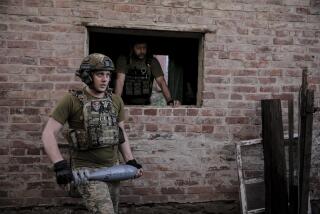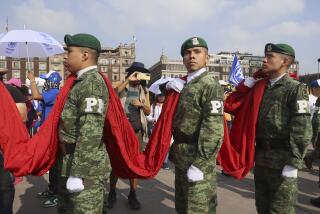Chechens Hopeful as Vote for New Parliament Starts
- Share via
GROZNY, Russia — Voters went to the polls Sunday to elect a parliament in war-torn Chechnya, fulfilling a key step in Russian President Vladimir V. Putin’s effort to defeat separatist rebels by turning power over to pro-Moscow Chechens.
Despite warnings by authorities that guerrillas might stage attacks to disrupt balloting, there were no immediate reports of serious incidents. The contest involves 342 candidates -- all representing various pro-Moscow parties -- competing for 58 seats in a two-chamber parliament. More than 24,000 police officers and troops provided security.
Voters interviewed at polling stations in Grozny, the Chechen capital, and in several villages repeatedly emphasized hope that the election and creation of a parliament would help bring peace and jobs.
“That things will get better -- that’s what we’re hoping for,” said Markha Zhurzhayeva, 43, a voter in Pobedinskoye, a village west of the capital. “That people will stop shooting, that kids will go back to school, that life will get better and we’ll be able to sleep without being afraid.”
Chechens exercised self-rule in the Caucasus republic after defeating Russian troops in a 1994-96 war, but Russian forces returned in 1999 and have fought guerrillas since.
In the last few years, in a process often dubbed “Chechenization,” Putin has sought to build up the strength of Chechens at least nominally loyal to Russia and turn over to them the task of keeping the republic in Moscow’s orbit.
This pro-Kremlin group was headed first by Chechen President Akhmad Kadyrov, who was assassinated last year. His son, First Deputy Prime Minister Ramzan Kadyrov, 29, is now seen as the republic’s real boss even though he lacks the top title.
Ramzan Kadyrov’s political muscle derives in part from his position as head of a widely feared Chechen paramilitary force of about 4,000, including many former guerrillas who have been given amnesty.
Some observers speculated several months ago that the new parliament might significantly check Kadyrov’s power. But Russian media have reported that he exerted so much influence on candidate selection for the parliamentary race that, despite the appearance of competition, both the upper and lower houses are certain to be packed with his supporters.
After creation of the parliament, Kadyrov’s power “will most likely be beyond anyone’s control or oversight -- effectively it already is -- and this leads to grave abuses,” said Nikolai Silayev, senior analyst at the Caucasus Studies Center of the Moscow State Institute of International Relations.
“Unlike his father, Ramzan Kadyrov is not disposed to compromises and deal-making; he tends to speed ahead at full throttle,” he added. “This means, potentially, that politics in the republic will be more conflict-prone.”
Many voters have pinned their hopes for peace on Kadyrov and appreciate his common touch.
Kadyrov has proved himself a good leader “because he’s tough, and toughness is what’s needed to get some order here,” said Zelimkhan Gayirabekov, 23, a student in Grozny. “He has a real army that answers to him. And he’s done some good things. He’s closed down the gambling business, for example.”
Kadyrov’s fighters and other Chechen security forces have increasingly replaced Russian troops in fighting separatists, but they have also been accused of kidnappings and human rights abuses.
“These new Chechen structures, purportedly pro-Russian, are the main groups that perpetrate terror in the Chechen Republic on behalf of our state,” Oleg Orlov, chairman of the Russian human rights group Memorial, said at a Moscow news conference last week.
Orlov suggested that the path to peace in Chechnya must include a political process that would allow those favoring independence to argue their case with words rather than guns.
“There are many political ideas and forces in Chechen society,” he said. “One of these political forces must represent separatism, so that separatists could politically voice their ideas, so that they should not express this idea with the help of high explosives or machine-guns.... Separatism should be able to take part in the overall political process.”
It appears extremely unlikely, however, that Putin would ever agree to such a policy.
Chechen President Alu Alkhanov’s term runs until 2008, but many observers believe he could be pushed out early if Putin wished to name Kadyrov his successor. That could not happen before October 2006, when Kadyrov turns 30, the minimum age for the post under Chechnya’s constitution. The appointment would need approval by the republic’s parliament.
Candidates advocating Chechen independence -- the goal of fighters based in the republic’s mountains and remote villages -- were not allowed to compete in the election. However, both the younger and elder Kadyrov, as well as some key associates, were part of the separatist camp during much of the 1990s. A few candidates were associated with the guerrillas more recently, including Magomed Khanbiyev, a once-powerful rebel general who surrendered and received amnesty last year.
Kadyrov’s policy of granting amnesty to former rebels who switch sides is a smart move, said Umar Adayev, 57, a welder in the village of Bratskoye, west of Grozny. “They came to the realization there’s a different and better way to live,” he said. “It’s his achievement that he gave people an opportunity to return to normal life.”
Some Russian analysts believe that Chechenization -- essentially turning the republic’s conflict into a Chechen civil war instead of a Russian-versus-Chechen war -- is a mistake because it could reduce Moscow’s direct influence. But Putin appears willing to let Kadyrov rule as a local strongman as long as he keeps the republic formally a part of Russia.
The effort has had some success. Russian military deaths in Chechnya have fallen from 1,397 in 2000 to 161 last year, according to official statistics.
“The essence of this approach is to hand over genuine levers of control, as well as the bulk of state property, to the republic in exchange for purely formal loyalty,” said Sergei Markedonov, head of the interethnic relations group at the Moscow-based Institute for Political and Military Analysis. “The idea is: ‘They can pretend to be loyal to President Putin, and we will pretend that Chechnya is part of Russia.’ ... I view this trend as dangerous because the people who actually come to power harbor feelings that are hardly altruistic toward Russia.”
*
Natasha Yefimova of The Times’ Moscow Bureau contributed to this report.
More to Read
Sign up for Essential California
The most important California stories and recommendations in your inbox every morning.
You may occasionally receive promotional content from the Los Angeles Times.










